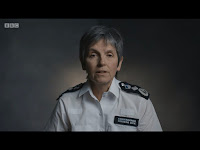 |
| Picture: BBC |
If, like me, you watched the BBC's three-part documentary, Stephen: The Murder That Changed A Nation, we will have a shared frustration. Without trivialising the racist murder, 25 years ago, of teenager Stephen Lawrence, the series at times felt like one of those exalted police procedurals, like Line Of Duty, where you already know who committed the crime, but watch in edge-of-the-sofa agitation over consecutive nights as the perpetrators evade justice. Sometimes, justice prevails, sometimes it doesn't.
 |
| Picture: BBC |
It would have been very easy to simplify the subject of this series into three acts - the police as bad, the prime suspects as even worse, and the Lawrences as victims. But over the three episodes, Asif Kapadia, James Gay-Rees and James Rogan carefully, respectfully built up a powerful, tragic and, ultimately, disappointing picture of British social justice via the many layers of the case.
These suspects - whose names, we learned, had been listed on a piece of paper left for police within hours of Stephen's murder - were and still are known in the Eltham area. Their Facebook timelines still receive complimentary messages from racists. The nation, though, formed its own opinions of the group when they arrived, strutting, goading, wearing sunglasses and looking like they were on a Friday night out, at the McPherson public inquiry in March 1988. The composure of their interviews with Bashir had been dropped. The image of Norris, in particular, snarling and bearing his teeth, will remain ingrained in the memory as a totem of the entire Lawrence murder. As will the Daily Mail's challenge to the gang, with editor Paul Dacre's infamous "MURDERERS" front page splash and its sub-deck challenge: "The Mail accuses these men of killing. If we are wrong, let them sue us." I'd hardly call myself a fan of the newspaper, or indeed Dacre, and even if his personal connection to the Lawrences was simply that he'd employed Neville as a decorator, the line he took, and the subsequent persistence in the story, deserves some credit. Inevitably, the attempt to tease the Eltham gang out didn't succeed, but an important addition was made to the tabloid front page hall of fame and, for once, a newspaper like the Mail campaigning for social justice.
 |
| Picture: BBC |
Attitudes might be one thing, but the role of corruption in the Lawrence case became another intriguing aspect of the documentary, adding another bitter ingredient to the overall shambles. Commenting on one specific allegation of a particular detective's alleged connections to David Norris' drug dealing father, Cressida Dick says that today she would shut down any corruption fast. The disturbing thing is, we're talking about police corruption in the mid-1990s, not the 1960s and 1970s, when London's crime gangs had detectives in their pockets, and when dodgy handshakes came in handy to get people out of parking tickets and much more serious offences. This was when the fictional Gene Hunt and Jack Reagan were very real, unreconstructed individuals who could politely be described as "cutting corners" in getting the job done. The idea that such practices actively hampered the Lawrence investigation in, what should still be regarded as recent history, is more than unpleasant.
In the end, Stephen: The Murder That Changed A Nation painted a picture of a police service which had both unconscious and conscious bias towards the black community, in which racism was almost a casual aspect of the Met culture. An archive clip of former Police Federation chief Len Curtis questioning whether "nigger" was an abusive term appeared to underline the suggestion, stated so strongly in the McPherson Inquiry outcome, that the capital's police service was riven by "institutional racism". Racism, it should never be forgotten, remains at the core of the Stephen Lawrence story. He was not only murdered by racists, but the subsequent investigation was either handled indifferently and incompetently, or with intentional reluctance and scepticism towards the victim's story, making that racist, too.
That two of the gang have been convicted for Stephen's murder will be only of limited comfort to the Lawrence family. Doreen Lawrence has said she wants to focus on her other son and grandchildren. She has given what she says is her last interview on the subject. The Met is maintaining an open case on the murder enquiry, something I suspect they will be obliged to do out of embarrassment as much as due process. I'm a big fan of what the police do. Under ever-shrinking resources, and increasing pressures from terrorism and, in London, knife crime in general, the thin blue line has grown thinner. They deserve our admiration and support. But the Stephen Lawrence murder, is a chapter in the Met's history that should not only never be forgotten, but continuously referred to. Racism is ugly to begin with, but when it yields the violent death of a bright, talented, likeable teenager - no matter what his skin colour - there should be no place for it to be investigated as a lesser priority. All lives count. All lives matter. Kudos to the BBC for, over the last three nights, reminding us of that fact.
 |
| Picture: BBC |


No comments:
Post a Comment